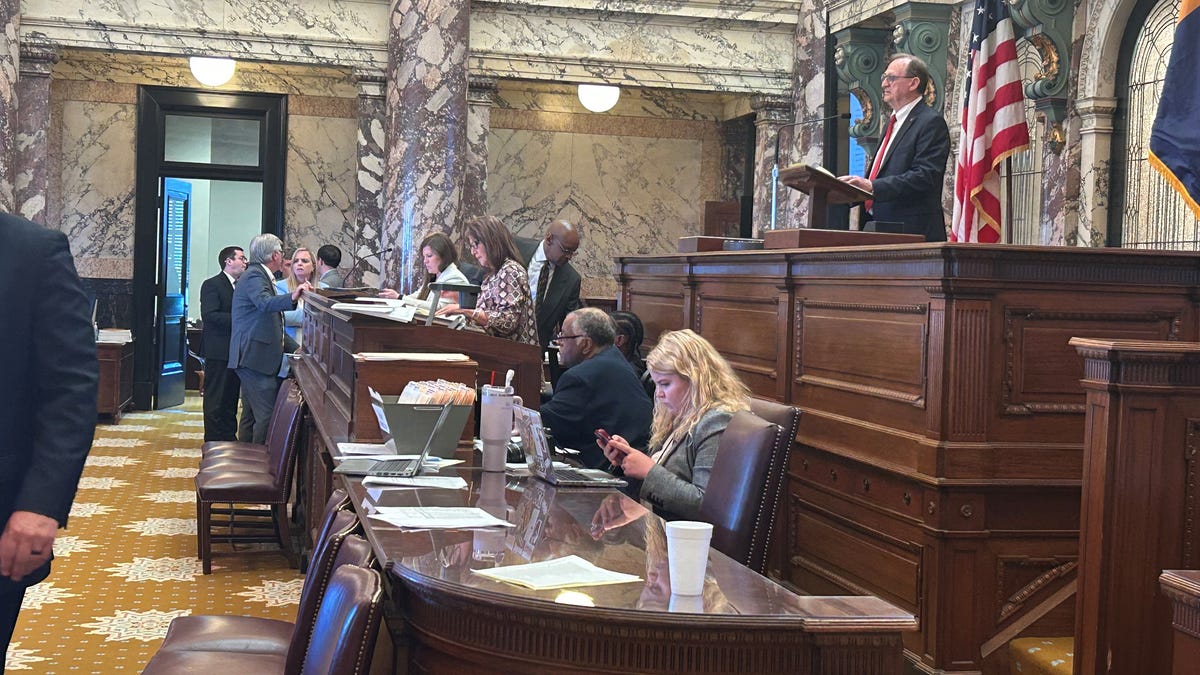When Mayor Justin Elicker learned that New Haven was on a list of six “sanctuary cities” designated by the federal government in Connecticut, he said he wasn’t surprised.
“This is something we expected, and we are proud of it. New Haven is proudly a welcoming city. It’s one of our defining characteristics and values,” Elicker said at a press conference on Friday.
On Thursday night, the Department of Homeland Security released a list of over 500 cities, counties and states that the agency deems “sanctuary jurisdictions.” Included on that list are six Connecticut cities — East Haven, New Haven, Windham, New London, Hartford and Hamden — and the state of Connecticut itself.
“Sanctuary city” does not have a clear legal definition, but the Trump Administration defines it as areas that “obstruct the enforcement of Federal immigration laws, according to the federal government’s website.
“Sanctuary jurisdictions including cities, counties, and states that are deliberately and shamefully obstructing the enforcement of federal immigration laws endangering American communities. Sanctuary cities protect dangerous criminal aliens from facing consequences and put law enforcement in peril,” a press release from the department reads.
State leaders and local elected officials from the six cities have responded to the designation in a variety of ways: with pride, confusion and denial.
“That’s a mystery to me. I really have no idea where [President Donald Trump] is coming from,” Mayor Michael Passero of New London told the Connecticut Mirror on Friday.
Passero said New London has always followed federal and state law. He said a person’s immigration status isn’t relevant to local law enforcement, and it’s not their policy to ask. But he said that shouldn’t qualify the city as a “sanctuary jurisdiction.”
Passero said New London, which has always considered itself welcoming to immigrants, may not fit with Trump’s idea of what America should look like.
“New London has always been, for 400 years, a multicultural city, because we’re a seaport,” he said, adding that his own parents were immigrants.
Mayors Lauren Garrett of Hamden and Arunan Arulampalam of Hartford underscored the variety of backgrounds that make up their cities’ populations and criticized the federal government’s statements.
“Hamden is a place that prides itself on diversity, we respect all of our neighbors, and we are in complete compliance with state and federal law. We will not be bullied by a federal administration that clearly does not understand how the law works, nor will we play into their game of shifting focus away from their campaign of defunding essential public services,” Garrett wrote in a statement.
Arulampalam said in a statement that he was committed to “ensuring that every resident, regardless of where they come from or what their story is, has the opportunity to succeed.”
“While my administration remains laser-focused on real solutions that protect our community, it is clear that current federal policies do not share this commitment to safety and threaten to undermine the gains we have made,” Arulampalam added.
Mayor Joseph Carfora of East Haven called the designation “absurd” and “baseless.” He said the town planned to reach out to the Department of Homeland Security “to understand how such an unfounded statement was made without any consultation or communication with our office.”
State Officials Respond
Both Attorney General William Tong and Gov. Ned Lamont said the Trump administration’s claim that Connecticut had “self-identified” as a sanctuary jurisdiction was false.
“There is nothing in our laws or statutes that says Connecticut is a ‘sanctuary’ state. We are not. That is a meaningless term,” Tong said in a statement.
But Republican lawmakers pointed to the legislature’s recent passage of a bill that will expand the state’s Trust Act — Connecticut’s law outlining the circumstances under which local and state officials may work and communicate with the federal government’s efforts to detain unauthorized migrants. The bill received final passage earlier this week; Lamont has not yet signed it.
“It’s no surprise the Department of Homeland Security labeled Connecticut and several of its communities as ‘sanctuary jurisdictions,’” House Minority Leader Vincent Candelora, R-North Branford, said in a statement on Friday. “Democrats in the legislature have taken extreme positions, expanding the Trust Act far beyond its original purpose of protecting victims and maintaining safety. Instead, it now shields illegal immigrants who are endangering our communities.”
The current Trust Act, which was passed in 2019, generally prohibits Connecticut law enforcement from arresting someone solely on the basis of a detainer — a request from U.S. Immigration and Customs Enforcement that police hold a person for up to 48 hours so federal agents can pick them up — with some exceptions.
Local law enforcement and corrections officials in Connecticut may only comply with a federal detainer request if ICE presents a judicial warrant, if the person is on a terrorist watch list or if the person in their custody has been convicted or pleaded guilty to a class A or B felony — crimes like murder, sexual assault, kidnapping, robbery and first-degree manslaughter.
House Republicans drafted a letter to Lamont earlier this week asking that he veto the Trust Act expansion, which allows individuals to sue over alleged violations of the law, but also adds 13 new crimes to the list of those for which state and local law enforcement can comply with a federal detainer request.
In the letter, Republicans said they felt the law “too often protects individuals who pose real threats to our communities, rather than promoting safety and cooperation.”
Senate Minority Leader Steven Harding, R-Brookfield, and Sen. Rob Sampson, R-Wolcott, referred to Connecticut in a statement as a “super sanctuary state” and said the expanded Trust Act would “further hinder federal law enforcement and burden property taxpayers.”
But House Majority Leader Jason Rojas, D-East Hartford, said he didn’t think the “sanctuary” designation should change the legislature’s decision to go forward with the Trust Act expansion. He said lawmakers had discussions with immigration advocates about trying to ensure the bill didn’t result in retaliation from the federal government, which could hurt the same people the bill was trying to help.
“ But at the end of the day, you can’t totally compromise on your values because of political threats and intimidation,” Rojas told CT Mirror.
Rojas said he didn’t have an opinion about the “sanctuary state” designation. “ I think about the people who are just trying to live their lives, raise their families, go to work. If there’s a level of confidence that we can give them that they’re welcome here, I think we should do that,” he said.
Speaker of the House Matt Ritter, D-Hartford, said in a statement that Connecticut was not a “sanctuary jurisdiction.”
“The Trump Administration is continues to use divisive language to frighten and confuse people,” Ritter said.
Lamont spokesperson Rob Blanchard said Lamont plans to sign the Trust Act expansion that lawmakers approved.
“Connecticut’s Trust Act, which was originally bipartisan, is consistent with federal constitutional standards and reflects sound public safety priorities. I am focused on making sure people feel safe in our schools, churches, and elsewhere. Nothing about this makes Connecticut a ‘sanctuary’ in any legal or practical sense – it makes our state one that upholds the Constitution, respects the rule of law, and prioritizes the safety and well-being of our communities,” Lamont said in a statement.
Elicker said at the press conference that he, too, wanted New Haven residents to feel safe going about their lives.
“We want our residents to be comfortable calling the police to report a crime… we want our residents to seek out healthcare should they need it. We want to make sure our immigrant children are comfortable and safe going to school,” Elicker said.
He said New Haven did not “obstruct justice,” but that they also would not take on the federal government’s responsibility for immigration enforcement.
“Our police department has already too many things to worry about without having to be commandeered by the federal government to implement an unjust and inappropriate policy,” he said.































